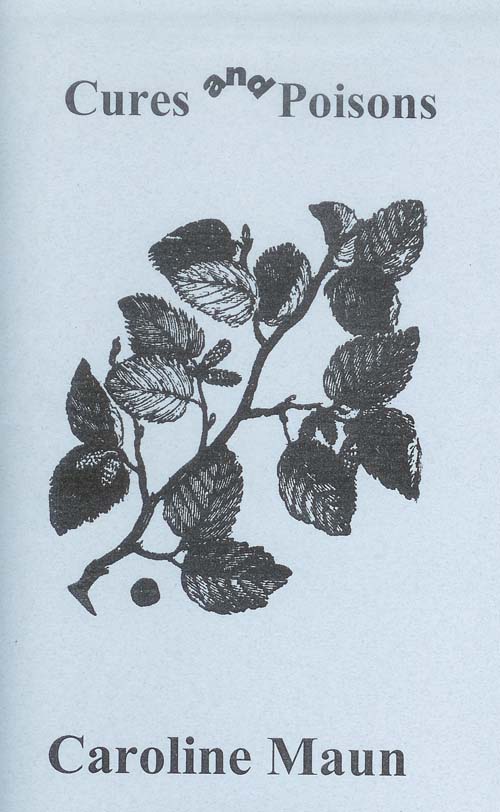Issue 2 - Winter 2010 Reviews Anxious Music Blood Dazzler Cities of Flesh and the Dead Crazy Love Cures and Poisons Dark Card and Mom's Canoe Fire Pond How to Live on Bread and Music Mister Skylight Paternity Perpetual Care Pictures in the Firestorm Rhapsody of the Naked Immigrants Rock Vein Sky Six Lips Slaves to Do These Things Slide Shows The Air around the Butterfly The Guilt Gene the nested object Interviews
 |
For readers captivated by the poem “Cicadas as Parable” in Caroline Maun’s first volume, The Sleeping (2006), her second volume Cures and Poisons offers an even more astounding glimpse into the parallels between the insect and the human worlds. In 2006 Maun described cicadas as large, winged insects doomed to be reborn every seventeen years with “no time to eat,/sleep or reflect or watch where one goes.” They remind us that we too are “slaves to our appetites” (The Sleeping, 4). The poem in Cures and Poisons (2009) that most closely evokes the fate of the hapless cicada is the parable of the artificially inseminated queen bee, her hive so displaced over the centuries that the angry and unrepresented drones had “left/in search of independent flowers” (“The Abdication of the Bees”). Through Maun’s bee-human analogy she is possibly signifying that artificial fertilization in both the insect and the human realms squashes the fidelity of the underperforming drone/husband. Among other insects in this thirty-nine poem collection are the mantis, the spiders, and the fly. Maun is at her most bizarrely perceptive when she describes female mantises who eat their mates:
The human counterpart does not occur until years later, when two lovers talk on the phone, “feeling half alive, ravenous” (“Sexual Cannibalism,” Cures and Poisons). In many of Maun’s poems the autobiographical takes precedence over the metaphorical as she recollects a broken knee cap, a conversation with her mother, a ride in the country side with her father, the specters of nicotine withdrawal.. The most memorable of these recollections is her being raped at the age of sixteen (“I Was Failing Math and Just Sixteen,” Cures and Poisons). She alludes to this dreadful moment of her life in “I Didn’t Miss School” (Cures and Poisons); in the title poem of The Sleeping; and in an unpublished short story. Maun’s chapbook surprises, not only with the power of its images but also with its remarkable lyricism. In “On Becoming a Shadow” (Cures and Poisons) the traditional four-line ballad form is re-invented through the eye rhymes of the first stanza: “lost,” “most,” “cost,” “ghost.” Several other lyric transformations (“Some Demons are Devils” and “The Breadthless Length”), for example, appear to culminate in the last poem of the volume, “The Road”:
“The Road,” with lyrics by Caroline Maun, is on the sound track of a DVD, Phases of the Sun, which she recorded with musician Frank Koscielski. Maun wrote most of the lyrics for the album. Many of them are love songs and many of them blues-rock songs reminiscent of Leonard Cohen. Caroline’s soft clear voice adds just another dimension to a poet whose amazing talents inform all of her work.
Reviewed by Mary Jane Lupton. |
